
Front_Office_Operations
.pdf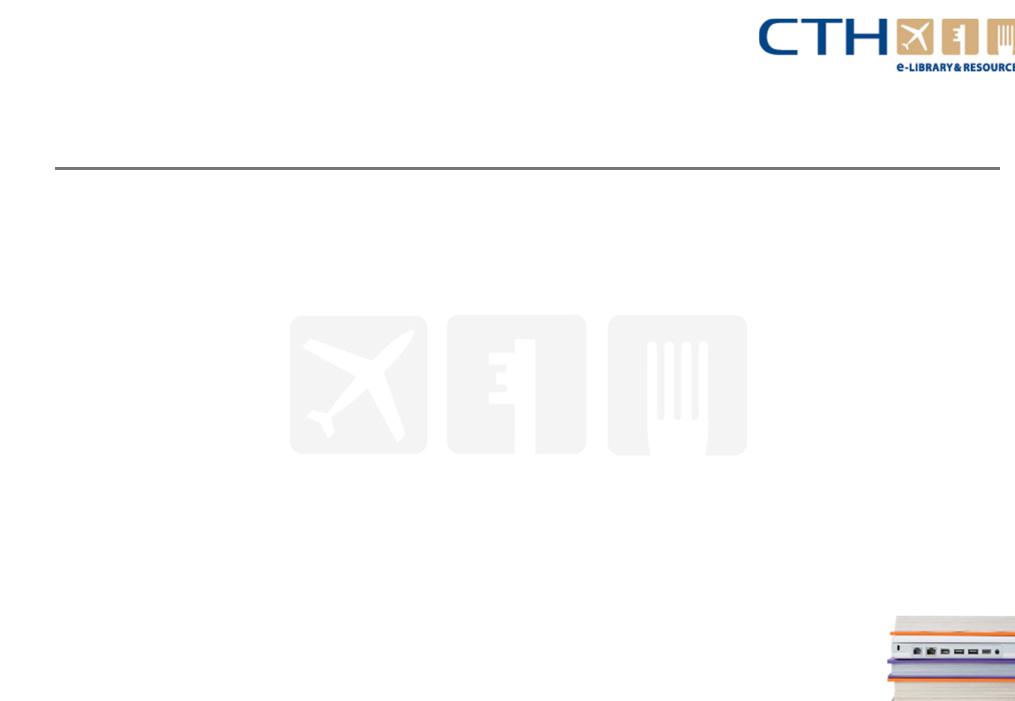
Chapter 1 – Introduction to front office operations
Property managements systems
A computerised hotel may offer:
●Database for recording enquiries (and converting enquiries to confirmed reservations and guests records as appropriate), with up-to-date records of enquiry status
●Reservations and group booking applications, with up-to-date records of the status of all reservations
●Computer-aided 'yield management' functions: helping reservation staff to make decisions about which reservations to accept, and at what rate, in order to maximise revenue
●The generation of arrival and departure lists and amendment notifications (from the most up todate reservation, check-in and check-out records)
●Up-to-date records of room status and availability (automatically up-datable as rooms are reported vacant, reading to re-Iet, allocated to arriving guests and so on)
●Guest records (guest's reservation, stay, charges etc), which can be used with applications
for reservation handling, registration (check-in), guest billing, check-out and so on
www.cthresources.com |
Page 61 |
|
www.cthawards.com |
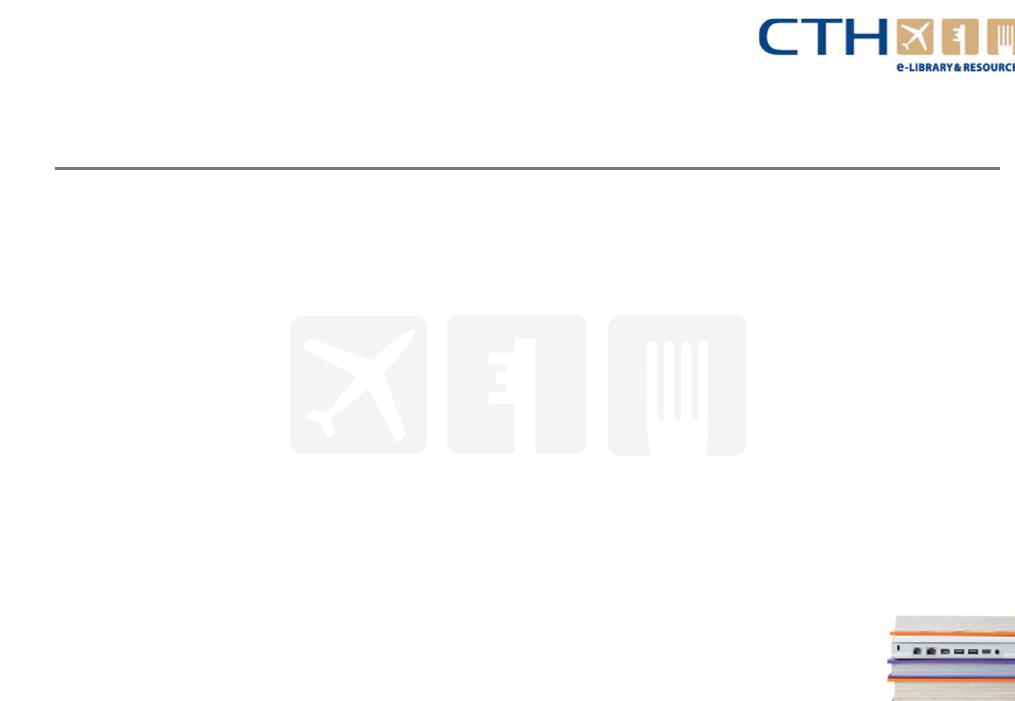
Chapter 1 – Introduction to front office operations
Property managements systems
A computerised hotel may offer: continued…
●Electronic Point of sale (EPOS) links from the restaurant, bar and reception through to guest billing, so that sales are automatically charged to accounts as they are processed
●Itemised guest accounts (posting all deposits, prepayments, room charges and extra charges for inclusion in the final bill), automatic generation of bills, paying processing, and automatic links through to general accounts functions
●Automatic night audit functions (checking and balancing all reports and accounts)
●Computer-aided housekeeping and maintenance scheduling (from centrally logged requests and arrival/departure information), and logging of housekeeping and maintenance reports to the main room status system
●Management information system - compiling forecasts, graphs, charts and statistical reports and analyses from all the other data stored in the system
●Calendar, diary and message facilities
www.cthresources.com |
Page 62 |
|
www.cthawards.com |

Chapter 1 – Introduction to front office operations
Property managements systems
A computerised hotel may offer: continued…
●Internal and external telephone call handling (switchboard), call logging, allocation of call charges to guests' accounts and automated early morning calls
●Integration with word processing packages, in order to personalise correspondence with guests' contact details
●Building management applications, such as energy monitoring and management systems (minimising unnecessary use of electric power); the use of electronic key coding for guest room doors; fire/intruder/theft alarm sensing systems; and so on
●Marketing applications, linking the reservation system to tourist information centres, hotel booking agencies and other group hotels, for example
www.cthresources.com |
Page 63 |
|
www.cthawards.com |
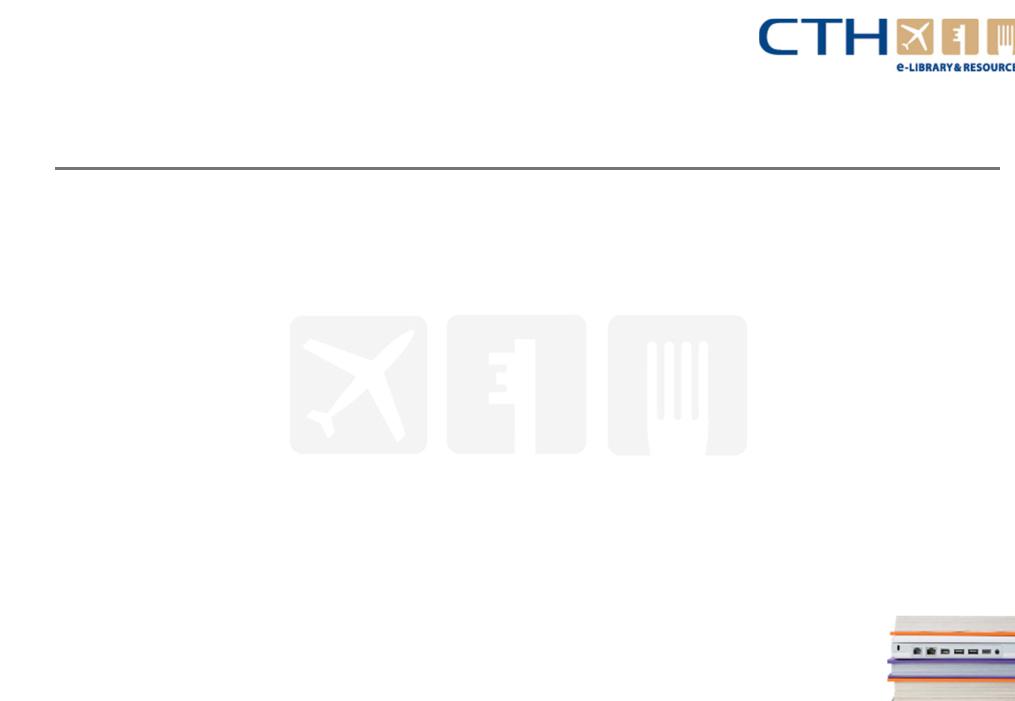
Chapter 1 – Introduction to front office operations
Property managements systems
6.2 General advantages and disadvantages of 'computerising' the hotel
|
Advantages of computerised system |
|
Disadvantages of computerised system |
|
Reduction in entries required, due to automatic |
|
Lack of compatibility, if the hotel has built up a |
|
updating of related records: multiple records and |
number of different applications separately: may not |
|
|
reports can be compiled from the same data |
|
interface or integrate with each other |
|
Automation of routine processes for speed and |
|
Time and cost of staff training in use of the system |
|
accuracy |
|
(which can be considerable) |
|
Reduction in duplications and messages for |
|
Limitation in speed e.g.. to find relevant fields and key |
|
inter-departmental data sharing |
|
in data, to answer security questions |
|
Reduced time and cost of data handling |
|
Initial set-up cost |
|
Reduced human error in copying across data |
|
|
|
and making calculations |
|
Limitation in memory/speed, for older computers |
|
Streamlined procedures (saving staff time and |
|
Extra 'housekeeping' tasks for night audit staff(e.g. |
|
improving guest service) |
|
backing-up the system, archiving old files) |
|
Storage of data without physical space |
|
Vulnerability to human error (e.g.. inputting data) |
|
Ease of access to data through 'search by' fields: |
|
Potential security risks to data from hacking and |
|
no need to leaf through files |
|
computer viruses |
www.cthresources.com |
Page 64 |
||
www.cthawards.com
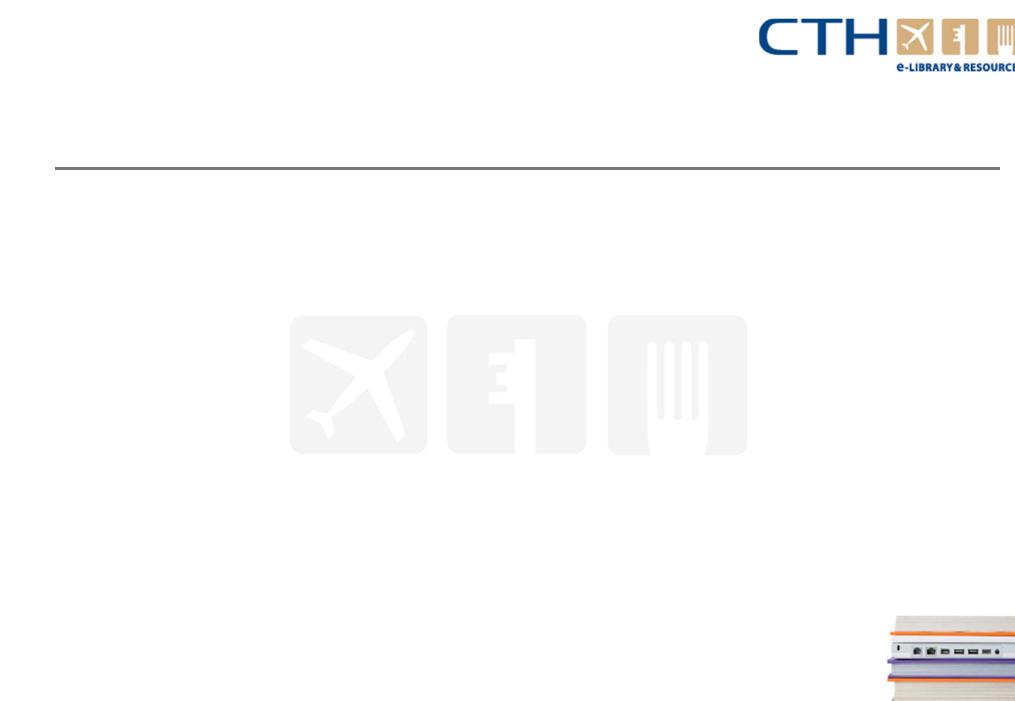
Chapter 1 – Introduction to front office operations
Property managements systems
6.2 General advantages and disadvantages of 'computerising' the hotel continued…
|
Advantages of computerised system |
|
Disadvantages of computerised system |
|
Updating of records without separate |
|
|
|
entries, erasures, crossing out etc |
|
Potential security risks if the system is misused |
|
|
|
Need for paper documents in any case (e.g.. for |
|
Speed of data searches, updates, |
|
'audit trail', written confirmations, back-up |
|
calculations, report/document preparation |
|
copies): may not save on paper/filing space! |
|
Presentation of reports and guest |
|
Vulnerability to technology problems and failures: loss of |
|
documentation In a variety of formats, with |
|
data (if not properly 'backed up') and inability to maintain |
|
professional (printed presentation) |
|
procedures |
|
|
|
Dependency on suppliers for serving, IT support, training |
|
Decision support applications: modelling of |
|
etc (which may be a problem if a small software or |
|
different 'what if scenarios to help planning |
|
hardware supplier goes out of business or is busy) |
|
|
|
Loss of staff knowledge and experience of underlying |
|
Automatic checking and reconciliation of |
|
procedures and manual processes, |
|
data, and reporting on discrepancies |
|
in case of systems failure |
|
Enhanced security through password |
|
|
|
protected access |
|
|
www.cthresources.com |
|
Page 65 |
|
|
|
www.cthawards.com |
|
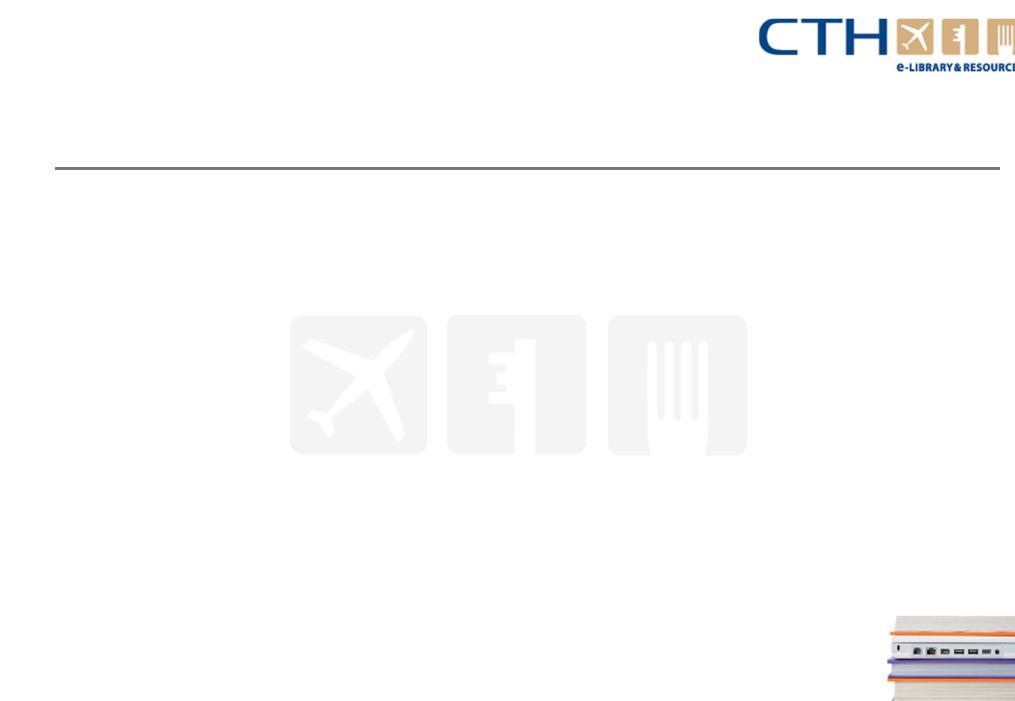
Chapter 1 – Introduction to front office operations
Different types of hotels
7.Different types of hotels
7.1Different types of establishment
7.2Different hotel types
7.3Different guest types
7.4The point being...
www.cthresources.com |
Page 66 |
|
www.cthawards.com |

Chapter 1 – Introduction to front office operations
Different types of hotels
7.1 Different types of establishment
In addition to hotels there are a number of other types of organisations letting accommodation, including:
Camp sites may let accommodation in the form of cabins or caravans, or may let space for guests to provide their own accommodation (e.g.. tents or caravans). Either way, there are reservations, registrations and billing to be processed, and facilities and services to be provided and maintained (e.g.. on-site shops, washrooms, utilities).
Ships and boats may also offer accommodation. Cruise liners are often called 'floating hotels', and have much in common with their land-based equivalents. Smaller boats (e.g.. a yacht or canal boat) may also be chartered by customers. This is a slightly different scenario, because the accommodation and services move off site: nevertheless, reservations, registrations and payments (and boat cleaning and maintenance between trips) are still administered from a front office.
www.cthresources.com |
Page 67 |
|
www.cthawards.com |
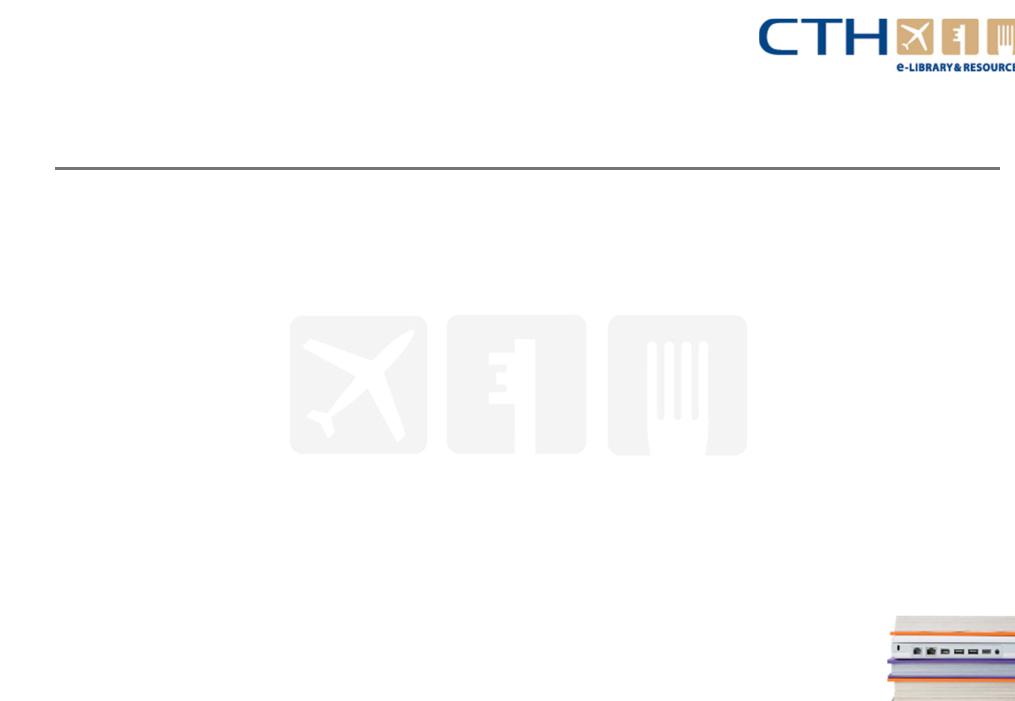
Chapter 1 – Introduction to front office operations
Different types of hotels
7.2 Different hotel types
There is also a wide variety even among hotels and their direct equivalents. Hotels may differ according to factors such as:
Size, or capacity. In the UK: a small hotel would be classed as one with 25 bedrooms or fewer; a medium-sized hotel, one with 25-99 bedrooms; a large hotel as one with more than 100
bedrooms; and a 'major' hotel as one with more than 300 bedrooms. Small hotels might also include bed and breakfast (6&6) establishments, public house and farm-stay accommodation.
Location, influences the type of clientele and style of the hotel. (Business travellers – tend to be attracted to hotel close to transport, central business districts and conference facilities, with good communications infrastructure. Leisure travellers – attracts to more remote or exotic locations.) Hotels may be classed by location as: city centre, main road (motel), airport, suburban, resort or country hotels.
Grade – depending on the hotel’s location, facilities/amenities and service standards, the price of accommodation may vary widely, from budget to luxury. There are a number of schemes
www.cthresources.com |
Page 68 |
|
www.cthawards.com |

Chapter 1 – Introduction to front office operations
Different types of hotels
7.3 Different guest types
Different types of guest may travel at different times of year or week. They may have different needs and preferences in regard to the rooms, services and facilities offered by the hotel. They may have different budgets available to spend on their stay.
It will, therefore, be important for hotels to be aware of who their guests are, and to classify them as distinct 'market segments', when: planning and selling the facilities to prospective guests; anticipating and meeting the needs and wants of guests during their stay; and determining pricing policies that will attract the kind of guests the hotel wants (or gets).
Leisure or pleasure travellers
Leisure travellers (or tourists) travel for sightseeing, relaxation or entertainment. They are often highly seasonal: travelling during school holidays, best-weather periods or attracted by special events in an area. Because they are self-funding, they are price-sensitive and attracted by value for money. Their main requirements from a hotel may be comfort, entertainment, budget accommodation, convenient location (for tourism and transport), foreign currency exchange facilities - and helpful front office staff!
www.cthresources.com |
Page 69 |
|
www.cthawards.com |
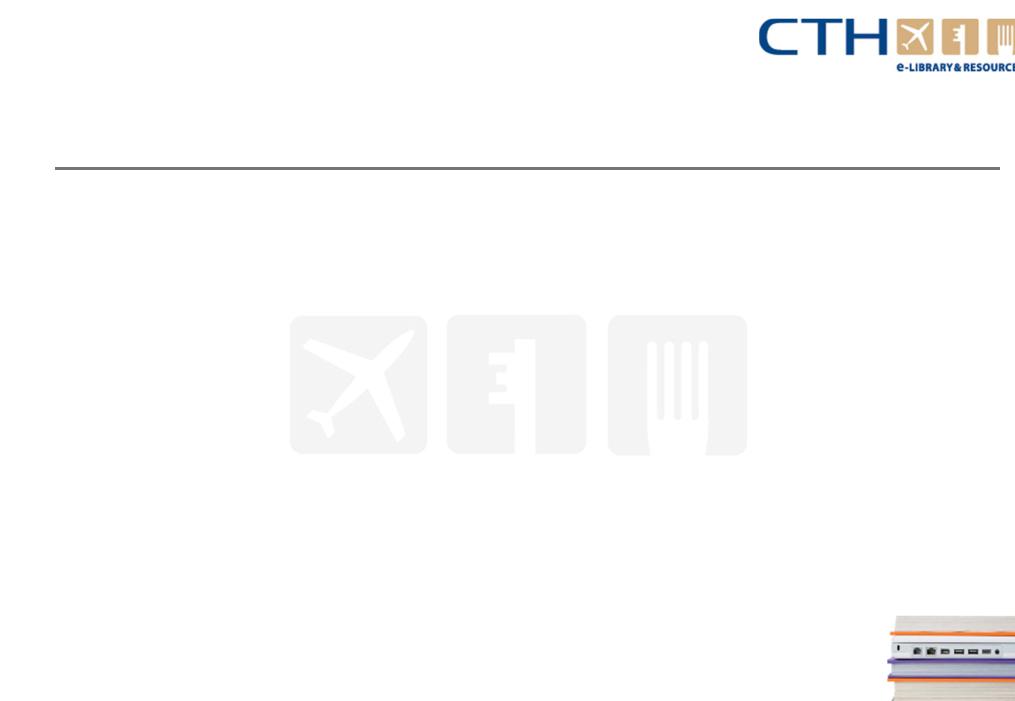
Chapter 1 – Introduction to front office operations
Different types of hotels
7.3 Different guest types continued…
Leisure travellers may be classified in any way that is helpful for the hotel, but you may hear the following terms:
●Domestic tourists are local people who stay at a hotel for weekend breaks or special functions.
●Foreign independent travellers (FITs) are international tourists who have made their own travel arrangements.
●Group inclusive tours (GITs) are groups of tourists travelling together on a 'package' tour, with accommodation and meals often booked in advance by the tour operator. Budget is often a consideration on such tours, because they may have limited 'spending money' on top of inclusions.
●Special interest tours (SITs) are smaller groups who are visiting an area with a special interest e.g.. ecotours, adventure tours or cultural tours, seeking particular locations, experiences or activities.
www.cthresources.com |
Page 70 |
|
www.cthawards.com |
